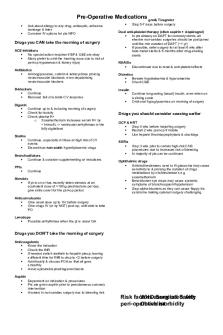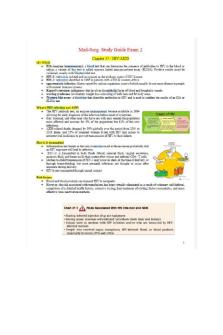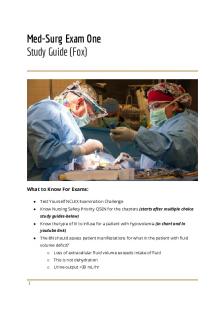Anaesthesia Guide - 3rd med study notes PDF

| Title | Anaesthesia Guide - 3rd med study notes |
|---|---|
| Author | Martina Wall |
| Course | Medicine |
| Institution | Queen's University Belfast |
| Pages | 2 |
| File Size | 86.7 KB |
| File Type | |
| Total Downloads | 106 |
| Total Views | 145 |
Summary
3rd med study notes
disease
pathophysiology
investigations
management...
Description
Pre-Operative Medications grel& Ticagrelor
Ask about allergy to any drug, antiseptic, adhesive bandage & latex Consider IV options for pts NPO
Drugs you CAN take the morning of surgery ACE Inhibitors No special action required if BP & U&E are okay Many prefer to omit the morning dose due to risk of peri-op hypotension & kidney injury Antibiotics Aminoglycosides, colistin & tetracyclines prolong neuromuscular blockade, even depolarising neuromuscular blockers B-blockers Continue Reduced risk of a labile CV response Digoxin Continue up to & including morning of surgery Check for toxicity Check plasma K+ o Suxamethonium increases serum K+ by ~1mmol/L -> ventricular arrhythmias in the fully digitalised Statins Continue, especially in those at high risk of CV events Discontinue non-statin hyperlipidaemic drugs Bronchodilators Continue & consider supplementing w/ nebulisers PPIs
Continue
Steroids If pt is on or has recently taken steroids at an equivalent dose of >10mg prednisolone per day, give extra cover for the peri-op period
Stop 5-7 days before surgery
Dual anti-platelet therapy (often aspirin + clopidogrel) In pts already on DAPT for coronary stents, all elective non-cardiac surgeries should be postponed until the min duration of DAPT (~1 yr) If possible, defer surgery for at least 6 wks after bare metal stents & 6 months after drug-eluding stents NSAIDs Discontinued due to renal & anti-platelet effects Diuretics Beware hypokalaemia & hypovolaemia Check U&E Insulin Continue long-acting (basal) insulin, even when on a sliding scale Omit oral hypoglycaemics on morning of surgery
Drugs you should consider ceasing earlier OCP & HRT Stop 4 wks before major/leg surgery Restart 2 wks post-op if mobile Use heparin thromboprophylaxis & stockings SSRIs
Stop 3 wks prior to certain high-risk CNS procedures due to increased risk of bleeding In majority of pts can be continued
Ophthalmic drugs Anticholinesterases used to t/t glaucoma may cause sensitivity to & prolong the duration of drugs metabolised by cholinesterase’s e.g. suxamethonium Beta-blocker eye drops may cause systemic symptoms of bronchospasm/hypotension Stop alpha-blockers as they can cause floppy iris syndrome making cataract surgery challenging
Anticonvulsants Give usual dose up to 1hr before surgery Give drugs IV (or by NGT) post-op, until able to take PO Levodopa Possible arrhythmias when the pt is under GA
Drugs you DON’T take the morning of surgery Anticoagulants Know the indication Check the INR If needed switch warfarin to heparin preop, leaving sufficient time for INR to drop to Peri-op risk Post-op chest infections are x6 more likely in smokers
1) 2) 3) 4) 5) 6)
Identity Procedure Consent Equipment checks Site marked? Allergies?
7)
Aspiration risk?...
Similar Free PDFs

Med Surg Study guide Notes
- 66 Pages

Med Term Study Guide
- 15 Pages

Med Surg 2 Final Study Guide
- 25 Pages
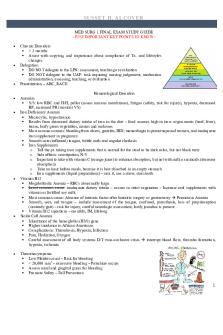
MED SURG 1 Final EXAM Study Guide
- 10 Pages

Med Surg 2 Exam 3 Study Guide
- 22 Pages
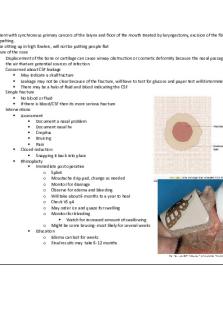
Med Surg II - Exam 2 Study Guide
- 57 Pages

Med surg exam 1 study guide
- 25 Pages

Med-Terms Final Exam Study Guide
- 34 Pages
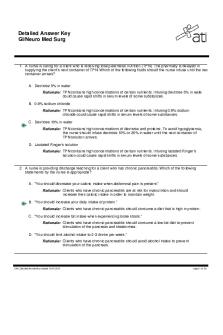
Ati gi med surg - Gi study guide
- 53 Pages

Med-Surg Test #2 Study Guide
- 10 Pages

Med surg exam 3 study guide
- 68 Pages
Popular Institutions
- Tinajero National High School - Annex
- Politeknik Caltex Riau
- Yokohama City University
- SGT University
- University of Al-Qadisiyah
- Divine Word College of Vigan
- Techniek College Rotterdam
- Universidade de Santiago
- Universiti Teknologi MARA Cawangan Johor Kampus Pasir Gudang
- Poltekkes Kemenkes Yogyakarta
- Baguio City National High School
- Colegio san marcos
- preparatoria uno
- Centro de Bachillerato Tecnológico Industrial y de Servicios No. 107
- Dalian Maritime University
- Quang Trung Secondary School
- Colegio Tecnológico en Informática
- Corporación Regional de Educación Superior
- Grupo CEDVA
- Dar Al Uloom University
- Centro de Estudios Preuniversitarios de la Universidad Nacional de Ingeniería
- 上智大学
- Aakash International School, Nuna Majara
- San Felipe Neri Catholic School
- Kang Chiao International School - New Taipei City
- Misamis Occidental National High School
- Institución Educativa Escuela Normal Juan Ladrilleros
- Kolehiyo ng Pantukan
- Batanes State College
- Instituto Continental
- Sekolah Menengah Kejuruan Kesehatan Kaltara (Tarakan)
- Colegio de La Inmaculada Concepcion - Cebu
